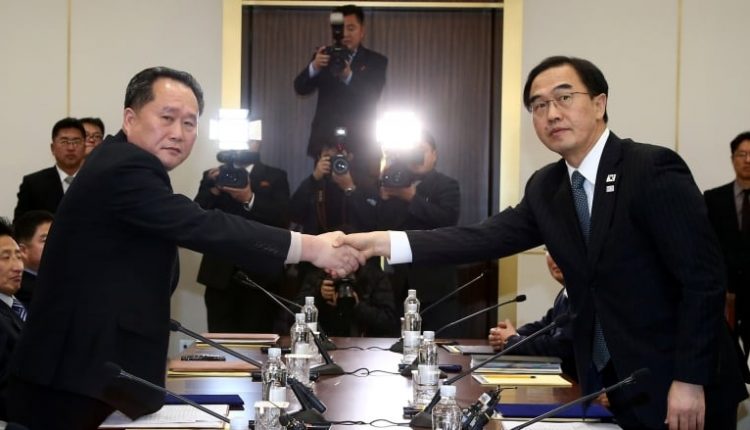North and South Korea agreed on Monday to begin reconnecting rail and road links, another step in an improving relationship that has raised U.S. concern about the possible undermining of its bid to press the North to give up its nuclear program.
The agreement on transport links came during talks in the border village of Panmunjom, aimed at following up on the third summit this year between South Korea’s President Moon Jae-in and North Korean leader Kim Jong Un, last month.
“The South and North reached the agreement after sincerely discussing action plans to develop inter-Korean relations to a new, higher stage,” said a joint statement released by the South’s Unification Ministry.
They agreed to hold ceremonies in late November or early December to inaugurate work on reconnecting the railways and roads that have been cut since the 1950-53 Korean War.
The two sides will carry out joint field studies on the transport plans from late this month, according to the joint statement.
They also agreed to discuss late this month a plan to pursue a bid to co-host the 2032 Olympic Games.
The talks were led by the South’s Unification Minister Cho Myoung-gyon and Ri Son Gwon, chairman of the North’s committee for peaceful reunification that handles cross-border affairs.
“We are at a very critical moment for the denuclearization of the Korean peninsula and the advancement of inter-Korean relations, and there’s also a second North Korea-U.S. summit coming up,” Cho told reporters before leaving for Panmunjom.
Talks between the two Koreas are running in parallel with U.S. efforts to press North Korea to give up nuclear weapons and missiles that the North says can hit the U.S. mainland.
Kim held an unprecedented summit with U.S. President Donald Trump in June in Singapore and the two sides are arranging a second meeting, which Trump said would likely happen after U.S. congressional elections on Nov. 6.
But despite the meeting between Kim and Trump, the United States is still pursuing a policy of “maximum pressure” to get North Korea to give up its nuclear weapon and ballistic missile programs.
Trump said on Wednesday South Korea would not lift sanctions on North Korea without U.S. approval.
The rail and road initiative and the joint Olympics bid were agreed by Moon and Kim at their latest summit, in the North Korean capital, Pyongyang.
Moon also said the North would permanently abolish key missile facilities in the presence of foreign experts.
The leaders of the two Koreas also endorsed a military pact, which includes the halting of military exercises, a no-fly zone near their border and the gradual removal of landmines and guard posts within the Demilitarised Zone (DMZ).
U.S. Secretary of State Mike Pompeo expressed “discontent” over that agreement, South Korea’s foreign minister Kang Kyung-wha said last week.
Kang’s remarks amounted to a rare confirmation of discord between South Korea and the United States, though the allies have said they remain in lockstep on North Korea.
In August, a plan for an inspection by the two Koreas for the rail project was scrapped after the United Nations Command (UNC), which overlaps with U.S. forces in the South and oversees affairs in the DMZ, rejected the passage of a test train carrying fuel, military sources said.
Cho, asked before the meeting if the UNC had given approval for a study of transport links over the DMZ, said: “We’re in close consultation with relevant countries.”


